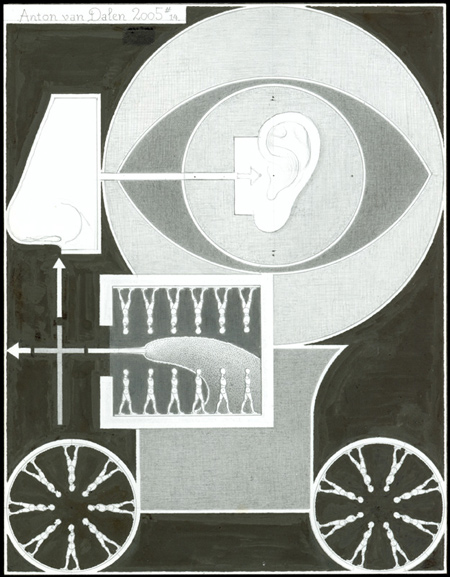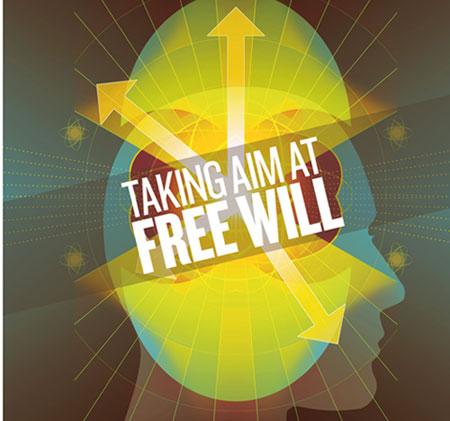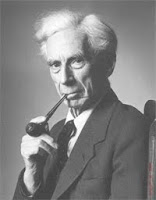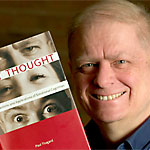For decades, scientists have dreamed of building computer systems that could replicate the human brain’s talent for learning new tasks.
MIT researchers have now taken a major step toward that goal by designing a computer chip that mimics how the brain’s neurons adapt in response to new information. This phenomenon, known as plasticity, is believed to underlie many brain functions, including learning and memory.
A companion blog for the book This Is Philosophy of Mind: An Introduction, 2nd Edition by Pete Mandik, from Wiley-Blackwell Publishers.
Wednesday, November 16, 2011
Mimicking the brain, in silicon - MIT News Office
Mimicking the brain, in silicon - MIT News Office
Monday, November 14, 2011
Is Neuroscience the Death of Free Will? - NYTimes.com
Is Neuroscience the Death of Free Will? - NYTimes.com:
Philosopher Eddy Nahmias in the New York Times:
Philosopher Eddy Nahmias in the New York Times:
Is free will an illusion? Some leading scientists think so. For instance, in 2002 the psychologist Daniel Wegner wrote, “It seems we are agents. It seems we cause what we do… It is sobering and ultimately accurate to call all this an illusion.” More recently, the neuroscientist Patrick Haggard declared, “We certainly don’t have free will. Not in the sense we think.” And in June, the neuroscientist Sam Harris claimed, “You seem to be an agent acting of your own free will. The problem, however, is that this point of view cannot be reconciled with what we know about the human brain.”
Sunday, October 23, 2011
Thursday, October 20, 2011
Tuesday, October 18, 2011
Saturday, October 8, 2011
Octophilosophy | The Scientist
Octophilosophy | The Scientist:
"Godfrey-Smith decided to connect this biological concept with his interest in the philosophy of mind, particularly in nonhumans. In 2010, he began a project with Alexandra Schnell, a graduate student at Macquarie University in Sydney, to conduct behavioral observation studies that address whether octopus intelligence differs from that of other species. Do octopuses learn differently? Does the decentralization of neurons mean cephalopods have multiple minds or competing consciousnesses?"
Comprehensive exam questions in philosophy of mind at Tufts
Comprehensive exam questions in philosophy of mind at Tufts:
http://ase.tufts.edu/philosophy/graduate/comps.asp#mind
http://ase.tufts.edu/philosophy/graduate/comps.asp#mind
Tuesday, October 4, 2011
Online visual guide to the brain
An online visual guide to the brain: Brain Function, Anatomy & Diagram | Body Maps
Drawings by Anton Van Dalen
I'm always on the lookout for artwork and other imagery that seems "philosophy-of-mind-y." Here's a bunch: Drawings by Anton Van Dalen: Anyone can tell that echoes move forward and backward in time, in... - but does it float.
Monday, October 3, 2011
Philosophy Bro on Zombies, Minds, and Possibility
Philosophy Bro: Mailbag Monday: Zombies, Minds, and Possibility
Excerpt:
Excerpt:
So Kripke's Modal Argument and Chalmers' Zombie Argument both rely on the notion of possible worlds that we touched on last week, and they're both arguments against physicalism, the idea that everything can be described in terms of physical properties - if it's not physical, fuck it. It's not real. That's an interesting thesis for philosophers of mind, because it sure seems like consciousness isn't just physical. Descartes famously imagined himself as nothing but a mind - if everything physical ceased to exist, he said he could definitely keep thinking.
Thursday, September 29, 2011
Derek Parfit in the New Yorker
 |
| Derek Parfit. Photo by Steven Pyke. |
Wednesday, September 28, 2011
The LEGO Turing Machine - YouTube
The LEGO Turing Machine - YouTube
"A TV Shop themed demonstration of a Turing Machine made in LEGO Mindstorms. It was made as part of a project at computer science at Aarhus University. A blog about the project is available at http://legoofdoom.blogspot.com"
"A TV Shop themed demonstration of a Turing Machine made in LEGO Mindstorms. It was made as part of a project at computer science at Aarhus University. A blog about the project is available at http://legoofdoom.blogspot.com"
Tuesday, September 27, 2011
Andrew Cullison Video on Writing a Short Philosophy Paper
Andrew Cullison Video on Writing a Short Philosophy Paper: Cullison's short video presents guidance for students on writing philosophy. (The sample in the video is on free-will.) Follow the link above for some handouts.
Monday, September 26, 2011
Scientists use brain imaging to reveal the movies in our mind
Scientists use brain imaging to reveal the movies in our mind:
"Using functional Magnetic Resonance Imaging (fMRI) and computational models, UC Berkeley researchers have succeeded in decoding and reconstructing people’s dynamic visual experiences – in this case, watching Hollywood movie trailers. As yet, the technology can only reconstruct movie clips people have already viewed. However, the breakthrough paves the way for reproducing the movies inside our heads that no one else sees, such as dreams and memories, according to researchers."
Mental rotation
One line of research in empirical science that is pertinent to the topics of imagination and mental imagery involves a phenomenon known as "mental rotation." The following is excerpted from the "Mental Rotation" supplement to the "Mental Imagery" entry at the Stanford Encyclopedia of Philosophy:
Shepard & Metzler (1971) introduced the concept of mental rotation into cognitive science with what has become one of the best-known experiments in the field. This fame may, in part, be because the experiment is associated with a set of memorable graphical images (e.g., figure 1), some of which made it onto the cover of the issue of Science where it was first published. However, it is also a remarkably elegant experiment, that produced some strikingly clear results. The findings seemed directly to refute the Behaviorist doctrine, still holding considerable sway amongst psychologists at the time, that thought processes depend entirely upon language. By suggesting that analog representations have an important role to play in thinking, the findings also raised prima facie difficulties (though not necessarily insurmountable ones) for the (digital) computer model of the mind that lay at the heart of the newly emerging field of cognitive science (Block, 1983a).
Figure 1
Some of the stimulus figure pairs used by Shepard & Metzler (1971).
A- Identical objects differing by a rotation in the plane of the page
B – Identical objects differing by a rotation in depth
C – Mirror-image objects (also rotated in depth)
Shepard & Metzler presented their subjects with pairs of drawings of three-dimensional, asymmetrical assemblages of cubes, as shown in figure 1 A, B, and C. In each pair, the right-hand picture either showed an assemblage identical to that shown on the left, but rotated from the original position by a certain amount, or else it showed an assemblage that was not only rotated, but was also the mirror image of the one to the left (figure 1 C). The experimental task was to tell, as quickly as possible (by pressing a button) whether the two objects depicted were in fact identical (except for rotation), or were mirror images. Shepard's hypothesis was that the task would be done by forming a three-dimensional mental image of one of the depicted objects, and rotating this whole image, in the imagination, to see whether it could be brought into correspondence with the other picture. The experimental results clearly supported this idea, because it was found that, for each subject, the time taken to confirm that both objects of a pair were, in fact, identical, increased in direct proportion to the angular rotational difference between them. It was as if the subjects were rotating their mental image at a steady rate (although this might be different for each subject), so that the further they had to go to bring their image into correspondence with the reference picture, the longer it would take them. On post-experimental questioning, most of the subjects confirmed that this was indeed how they believed that they had done the task. (Interestingly, it made no difference whether the rotation was in the plane of the page, or in depth.)
Friday, September 23, 2011
Patricia Churchland on eliminative materialism
Below is a video of philosopher Patricia Churchland discussing eliminativism AKA eliminative materialism. Note that it's probably fair to say of Patricia Churchland (as well as her husband philosopher Paul Churchland) that she is not a full-blown eliminativist, but instead subscribes to a blend of eliminativism and the identity theory: Some folk-psychological concepts (perhaps the concept of belief) should be thrown out in favor of neuroscientific ones, while others (perhaps learning and representation) can be retained and reduced to neuroscientific ones (maybe with some mild revision along the way).
Thursday, September 22, 2011
William James on willpower
 |
| William James |
As a final practical maxim, relative to these habits of the will, we may, then, offer something like this: Keep the faculty of effort alive in you by a little gratuitous exercise every day. That is, be systematically ascetic or heroic in little unnecessary points, do every day or two something for no other reason than that you would rather not do it, so that when the hour of dire need draws nigh, it may find you not unnerved and untrained to stand the test. Asceticism of this sort is like the insurance which a man pays on his house and goods. The tax does him no good at the time, and possibly may never bring him a return. But if the fire does come, his having paid it will be his salvation from ruin. So with the man who has daily inured himself to habits of concentrated attention, energetic volition, and self-denial in unnecessary things. He will stand like a tower when everything rocks around him, and when his softer fellow-mortals are winnowed like chaff in the blast.
Picturing mental causation
Some of the main proposals concerning the general structure of mental causation can be pictured in the following ways (from the Internet Encyclopedia of Philosophy entry on mental causation):
Interactionism:
Parallelism:
Epiphenomenalism:
Reductionism:
Interactionism:

Parallelism:

Epiphenomenalism:

Reductionism:

Wednesday, September 21, 2011
Neuroscience vs philosophy: Taking aim at free will : Nature News
Neuroscience vs philosophy: Taking aim at free will : Nature News
Excerpt:
Excerpt:
The experiment helped to change John-Dylan Haynes's outlook on life. In 2007, Haynes, a neuroscientist at the Bernstein Center for Computational Neuroscience in Berlin, put people into a brain scanner in which a display screen flashed a succession of random letters. He told them to press a button with either their right or left index fingers whenever they felt the urge, and to remember the letter that was showing on the screen when they made the decision. The experiment used functional magnetic resonance imaging (fMRI) to reveal brain activity in real time as the volunteers chose to use their right or left hands. The results were quite a surprise.
"The first thought we had was 'we have to check if this is real'," says Haynes. "We came up with more sanity checks than I've ever seen in any other study before."
The conscious decision to push the button was made about a second before the actual act, but the team discovered that a pattern of brain activity seemed to predict that decision by as many as seven seconds. Long before the subjects were even aware of making a choice, it seems, their brains had already decided.
The Mind Uploading Home Page
Mind uploading is a hypothetical process whereby one might achieve life after death in a way that is consistent with versions of physicalism such as functionalism. The Mind Uploading Home Page contains info on relevant scientific research.
Excerpt:
Excerpt:
The Mind Uploading home page is dedicated to the putative future process of copying one's mind from the natural substrate of the brain into an artificial one, manufactured by humans. This technology will radically alter society in many ways, as science fiction authors have begun to illustrate. Through this server, explore the science behind the science fiction!See also, this article: "Uploading the Mind".
Gilbert Ryle on philosophy of mind
The great philosophical behaviorist, Gilbert Ryle discusses philosophy of mind with J. O. Urmson in this episode of Logic Lane (1972) directed by Michael Chanan.
Is this how the world looks to a panpsychist?
When I watch these stunning computer animations by XVIVO Scientific Animation, I find that panpsychism seems a bit more plausible. Do others find a similar effect? Anyway, check out more of these at XVIVO's YouTube channel.
Bertrand Russell's solipsism joke
"As against solipsism it is to be said, in the first place, that it is psychologically impossible to believe, and is rejected in fact even by those who mean to accept it. I once received a letter from an eminent logician, Mrs. Christine Ladd-Franklin, saying that she was a solipsist, and was surprised that there were no others. Coming from a logician and a solipsist, her surprise surprised me." (Russell, p. 180). Russell, Bertrand., Human Knowledge: Its Scope and Limits,London: George Allen & Unwin, 1948.
Tuesday, September 20, 2011
Free online sources of Descartes's Meditations
Mollusks evolved brains on four different occasions
One of the early and famous arguments that the philosopher Hilary Putnam made in favor of functionalism involved pointing out how it is likely that humans and octopuses have very different nervous systems while similar mental states such as pains. Here's an interesting and pertinent article on the brains of mollusks:
Mollusks evolved brains on four different occasions
Possible Paper Topics by Curtis Brown
Suggested philosophy of mind paper topics by Curtis Brown: Philosophy of Mind - Possible Paper Topics
Philosophy and the Matrix: Descartes
This clip discussing the philosophical connections between Descartes and the Matrix movies features philosophers of mind such as Daniel Dennett, David Chalmers, Hubert Dreyfus, and Mark Rowlands.
Philosophy Bro on the Chinese Room
Philosophy Bro: Mailbag Monday: The Chinese Room
Excerpt:
Before I get into the experiment itself, here's the problem Searle is addressing - what does it mean for a machine to understand something? Is it possible we will ever produce a machine that can think on its own, that can learn and truly understand English? Offhand, it seems possible; after all, if we build a robot that speaks English as well as we do, who understands the nuances of language, who we just can't tell is a robot, then what exactly is the difference between his claim to know English and your best friend's claim to know English? This is the basis of the famous 'Turing Test' for AI - when we reach the point where we can no longer distinguish between a human and a computer when speaking to them, then we have truly achieved Artificial Intelligence.
Monday, September 19, 2011
Using the blog-post labels
Each post of this blog has one or more labels. You can see a list of the labels used so far on the right-hand column of the blog. Below is a list of the labels I'm planning on using. I've also provided a breakdown of the kinds of labels. Labels are sorted into three kinds: 1) Teaching-resource labels, 2) Media-type labels, and 3) Philosophy of mind topic labels.
Teaching-resource labels:
1. Syllabi
2. Paper topics
3. Exam questions
4. Teaching tips
Media-type labels:
1. Video
2. Further reading
3. Pictures
Topic labels:
1. Dualism
2. Idealism
3. Panpsychism
4. Behaviorism
5. Brains
6. Artificial Intelligence
7. Functionalism
8. Mental Causation
9. Eliminativism
10. Perception
11. Imagination
12. Emotion
13. Willpower
14. Free Will
15. Intentionality
16. Consciousness
17. Personal Identity
18. Life After Death
19. Physicalism
20. Other Minds
21. General philosophy of mind
22. Empirical science
Progress to date on the book
Here's the latest progress report on drafting the book This Is Philosophy of Mind: An Introduction for Wiley-Blackwell.

I'm aiming to have the first draft done by March 1, 2012 and the final draft delivered to the publisher September 1, 2012.
Here's a link to the book proposal: link.
I'm aiming to have the first draft done by March 1, 2012 and the final draft delivered to the publisher September 1, 2012.
Here's a link to the book proposal: link.
Interview with David Chalmers on consciousness
Here's a video of an interview with the philosopher of mind David Chalmers on consciousness and why it poses such a hard problem for philosophy and science:
Chinese room from the Philosophy of Mind MetaResource
The Philosophy of Mind MetaResource contains links to definitions and discussions of key terms in the philosophy of mind culled by Pete Mandik from the following sources:
- Eliasmith's Dictionary of Philosophy of Mind (DPM)
- The Stanford Encyclopedia of Philosophy (SEP)
- A Field Guide to the Philosophy of Mind (FG)
- The Internet Encyclopedia of Philosophy (IEP)
- Brain Hammer (BH)
Here's a sample entry:
Chinese room
[DPM] [SEP] [FG] [IEP] [BH]
- Eliasmith's Dictionary of Philosophy of Mind (DPM)
- The Stanford Encyclopedia of Philosophy (SEP)
- A Field Guide to the Philosophy of Mind (FG)
- The Internet Encyclopedia of Philosophy (IEP)
- Brain Hammer (BH)
Here's a sample entry:
Chinese room
[DPM] [SEP] [FG] [IEP] [BH]
Subscribe to:
Posts (Atom)



















